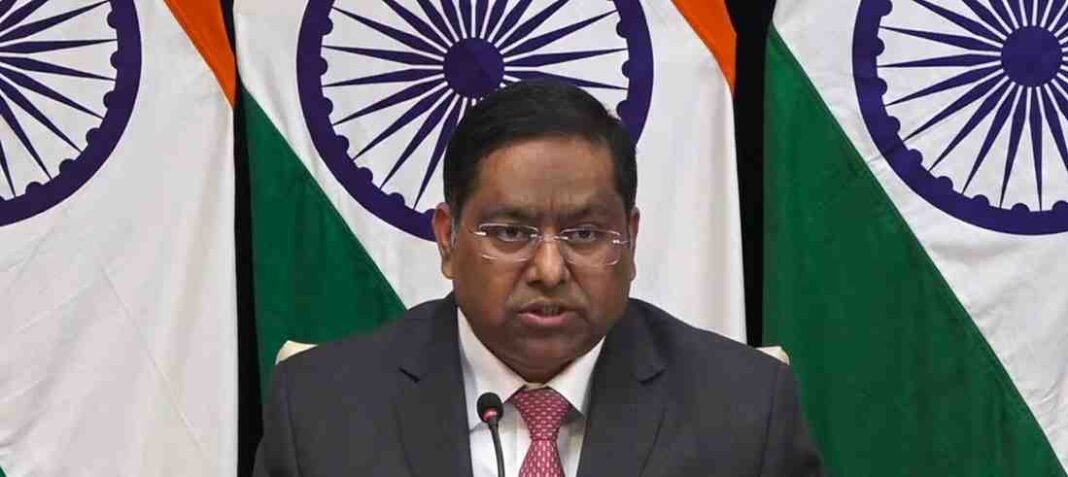New Delhi: India’s Ministry of External Affairs (MEA) on Monday issued a sharp rebuke to Pakistan’s Chief of Army Staff, Field Marshal Asim Munir, over his reported threats of nuclear retaliation against India during a visit to the United States.
Terming nuclear posturing Pakistan’s “stock-in-trade,” the MEA warned that such remarks reinforce global concerns about Islamabad’s nuclear arsenal being under the control of a military establishment allegedly linked with terrorist organisations.
“Our attention has been drawn to remarks reportedly made by the Pakistani Chief of Army Staff while on a visit to the United States. Nuclear sabre-rattling is Pakistan’s stock-in-trade. The international community can draw its own conclusions on the irresponsibility inherent in such remarks,” the MEA said. “It also reinforces doubts about the integrity of nuclear command and control in a state where the military is hand-in-glove with terrorist groups.”
The ministry also expressed regret that such provocative statements were delivered from the territory of a “friendly third country,” adding, “India will not give in to nuclear blackmail and will continue all necessary measures to safeguard national security.”
Munir’s Remarks in the US
According to ThePrint, Munir made the controversial comments at a black-tie dinner hosted by businessman Adnan Asad, Pakistan’s honorary consul in Tampa, Florida. He reportedly warned, “We are a nuclear nation; if we think we are going down, we’ll take half the world down with us.”
This is believed to be the first instance of a Pakistani Army Chief issuing such a threat from American soil against a third country. Linking his warning to tensions over the Indus Waters Treaty, Munir accused India of jeopardising the lives of “250 million” Pakistanis by suspending the agreement. He further threatened, “We will wait for India to build a dam, and when it does, we will destroy it with 10 missiles.”
Munir also mocked India over its performance in a recent four-day conflict, urging New Delhi to “accept its losses” and claiming, “Sportsman spirit is a virtue.” Drawing a metaphor between the two nations, he said, “India is like a Mercedes, Pakistan is like a gravel-laden dump truck — if the truck hits the car, who loses?”
He urged the Pakistani diaspora to unite behind their homeland, asserting that Pakistan, founded on Islamic principles, would be blessed with resources and divine support.
Political Reactions in India
Munir’s remarks drew widespread condemnation from Indian political leaders across party lines.
Shiv Sena (UBT) MP Priyanka Chaturvedi described the comments as “cowardly threats from a failed nation and a failed marshal” and called on the International Atomic Energy Agency (IAEA) to take control of Pakistan’s nuclear weapons.
“They are in the hands of an absolutely maniacal person threatening India from American soil. I want to ask the Americans how such a comment is acceptable,” she said.
BJP leader Gourav Vallabh declared, “This is New India — here, a bullet is answered with a shell. If Operation Sindoor had continued for another 2–3 days, Pakistan’s Air Force would have been wiped out.”
He also urged the International Monetary Fund (IMF) to stop financial assistance to Pakistan, calling Munir “the face of terrorism.”
Congress leader Imran Masood criticised the ceasefire, suggesting India missed an opportunity to take control of Pakistan-occupied Kashmir (PoK), which he claimed would have silenced such threats.
Strategic and Military Voices Respond
Retired Major General PK Sehgal downplayed the likelihood of Pakistan using nuclear weapons, calling such a move “physical suicide” for Islamabad.
“If Pakistan, even by mistake, uses nuclear weapons, it will be a catastrophe for all continents, but Pakistan will cease to exist,” he warned. Sehgal also alleged that Munir was “controlled” by Washington.
Former diplomat Rajiv Dogra dismissed Munir’s claim that the Indus River was not India’s “family property,” pointing out that countries like the US and China treat their rivers as strategic national resources. “He should consult an intelligent person before making such remarks,” Dogra said.
Indian Army Chief General Upendra Dwivedi also took a dig at Munir’s recent elevation to Field Marshal, remarking that Pakistanis might believe they “won” the recent conflict simply because their chief received a promotion. He credited initiatives such as “Justice done: Op Sindoor” for helping India gain an information edge.
Diplomatic Implications
The controversy is expected to deepen the already strained relationship between India and Pakistan, with the added dimension of Munir’s remarks being made from US soil potentially creating awkward questions for Washington.
India’s MEA emphasised that New Delhi will continue its firm stance against nuclear intimidation, and observers suggest the episode could draw renewed scrutiny on Pakistan’s nuclear security, especially given its military’s alleged links to extremist groups.
The remarks also come at a sensitive time, with tensions over the Indus Waters Treaty, recent border skirmishes, and Pakistan’s economic crisis forming the backdrop to Munir’s rhetoric.
The IMF’s recent assistance to Pakistan has already been criticised by some Indian politicians, who argue that such funds indirectly support destabilising military postures.
Whether Munir’s statements were intended as a show of strength to domestic audiences or as a strategic message to the international community, they have clearly triggered a strong and unified political reaction in India — along with renewed calls for global intervention to ensure Pakistan’s nuclear arsenal remains secure.








